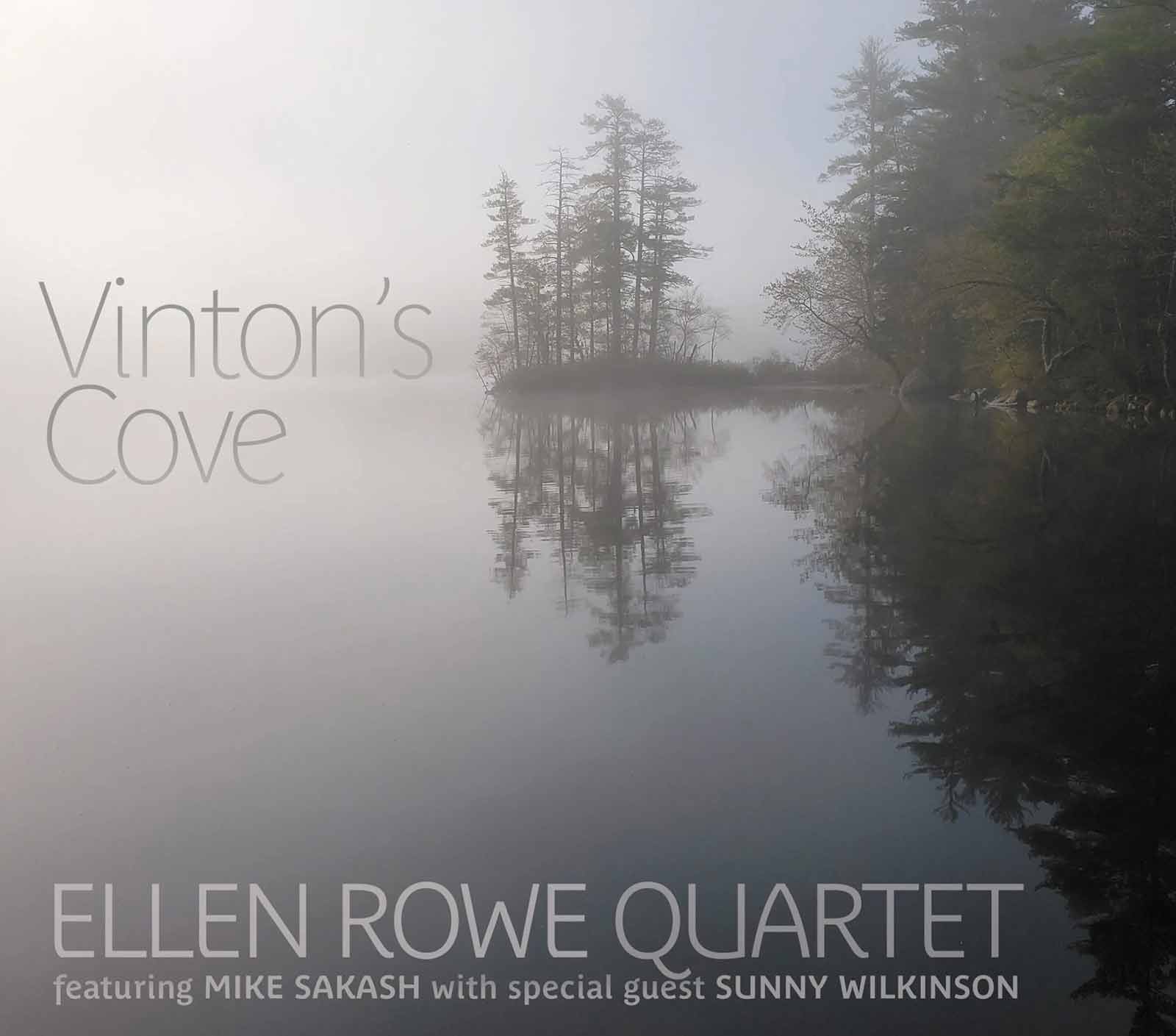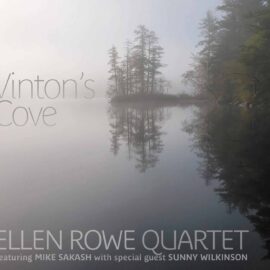| Jazz |

At a moment when much of the jazz world is wrestling with new hybrid languages, electronic textures, genre cross-pollinations, conceptual suites, political subtexts, the Ellen Rowe Quartet presents an album that feels, intentionally or not, like a step back into safer territory. Vinton’s Cove is exquisitely crafted, meticulously articulated, and emotionally sincere, yet it operates within an idiom that rarely challenges its own comfort zones. The result is a record that asks to be admired, perhaps even cherished, but not necessarily interrogated. This tension between mastery and conservatism, between refinement and risk-aversion, defines the album’s aesthetic core.
Rowe, a pianist of considerable elegance, opens the record with a palette of graceful voicings and unhurried phrasing. Her playing is poised, never indulgent, and consistently attentive to ensemble balance. But therein lies the complication: the music is almost too polished, too perfectly behaved. Jazz, even in its lyrical, introspective forms, thrives when its surfaces are slightly disturbed, when unpredictability briefly interrupts the flow. On Vinton’s Cove, those moments of rupture are rare. The album sustains a serene, carefully moderated emotional climate that is undeniably pleasant but occasionally borders on the predictable.
Nowhere is this issue more emblematic than in the inclusion of Joni Mitchell’s “Both Sides Now,” a song whose overexposure across decades has rendered it nearly radioactive for critics and listeners alike. It is not merely that the tune has been overplayed, it has been over-sentimentalized, reinterpreted with varying degrees of theatrical sincerity that often flatten its original ambiguity. Rowe’s decision to revisit it feels like a daring choice for all the wrong reasons: not because it pushes boundaries, but because the piece has become so weighed down by its cultural baggage.
Her arrangement is undeniably beautiful. It sidesteps melodramatic pitfalls, treads lightly, restores a sense of poise to the melody. And yet, one is left wondering: what does this version reveal that others have not? What conversation does Rowe hope to reopen? If the performance rescues the song’s poetry, it does not fundamentally alter its interpretive landscape. It is a high-caliber rendition of a tune that perhaps no longer needs rescuing. The excellence of the interpretation only underscores the limitations of the repertoire choice.
The quartet’s interplay reveals similar paradoxes. Rowe has assembled musicians who understand her musical philosophy to the letter: balance over bravado, clarity over experimentation, meticulous interaction over spontaneous combustion. Their cohesion is admirable, but at times almost too seamless. One longs for a moment of genuine friction, a passage where someone strains against the boundaries, where the music betrays its own vulnerability. Instead, solos glide by with understated intelligence but rarely create the sense of discovery that marks the most compelling jazz improvisation.
These aesthetic tendencies reflect, in part, Rowe’s professional trajectory. As a distinguished professor at the University of Michigan and former Eastman School student under Rayburn Wright and Bill Dobbins, she embodies a school of jazz shaped by academic precision. This lineage has produced extraordinary musicians, disciplined, conceptually rigorous, technically assured, but it also carries certain hazards: intellectual coherence can become a substitute for emotional daring, and technical clarity can overshadow the messiness that gives jazz its vitality. Rowe’s compositions bear the unmistakable imprint of that lineage: beautifully structured, emotionally coherent, yet occasionally circumscribed by their own refinement.
To her credit, Vinton’s Cove is not merely the product of academic craftsmanship; it is rooted in personal geography. Named after a small cove on Lake Kezar where her family has maintained a cabin since the mid-1950s, the album aspires to a kind of pastoral introspection. Several pieces were composed there, surrounded by still water and the isolating calm of the Maine woods. That sense of introspective retreat permeates the record. But pastoralism, in art as in music, is a double-edged sword: it can evoke profound serenity, or it can slide into a narrow emotional bandwidth. Here, the palette leans consistently toward the latter. The lake is beautiful, yes, but we rarely feel its storms.
One of the album’s most distinctive strengths lies in its sound design. The recording took place at Willis Sound, a renovated church equipped with Blue Note–style reverb plates. The acoustics lend a crystalline warmth to the piano and an inviting spatial halo to the ensemble.
At times, the sonic character evokes the refined ambiance of the ACT Music label, an aesthetic that suits Rowe’s sensibilities but also softens the album’s edges further. The space ennobles the music, perhaps even elevates it, but it also amplifies the album’s gentleness to the point of homogeneity.
Rowe’s artistic résumé, however, is unimpeachable. Her compositions have been performed by the Village Vanguard Orchestra, the BBC Jazz Orchestra, and the London Symphony Orchestra. She is a presence on international festival stages, from Brazil to Detroit. These accomplishments illuminate why the album often succeeds despite its cautious temperament: few musicians can craft beauty with such deliberate precision and such sincere emotional clarity.
And yet, the lingering impression is unmistakable. Vinton’s Cove is a beautiful album, but it rarely surprises. It invites admiration rather than astonishment, contemplation rather than confrontation. This is not necessarily a flaw, many listeners will find comfort and intellectual satisfaction in its serenity. But those seeking a record that challenges, disrupts, or reimagines will find themselves drawn instead to its craft rather than its courage.
One finishes Vinton’s Cove grateful for its beauty, but wishing it had allowed itself to be less orderly, less immaculate, and more willing, at least once, to break its own frame.
Thierry De Clemensat
Member at Jazz Journalists Association
USA correspondent for Paris-Move and ABS magazine
Editor in chief – Bayou Blue Radio, Bayou Blue News
PARIS-MOVE, November 18th 2025
Follow PARIS-MOVE on X
::::::::::::::::::::::::
Musicians:
Ellen Rowe – Piano, Composer, Arranger
Featuring Mike Sakash – Saxophones
Pete Siers – Drums
Dennis Carroll – Bass
Sunny Wilkinson – Special Guest Vocalist
Track Listing :
The Loons Of Vinton’s Cove
Refractions
Clipped In Blues
The Phoenix (Featuring Sunny Wilkinson)
Kind Folk
Ebb & Flow
Both Sides Now
All The Things You Are
Sylvan Way (Featuring Sunny Wilkinson)
I’ll Remember April

